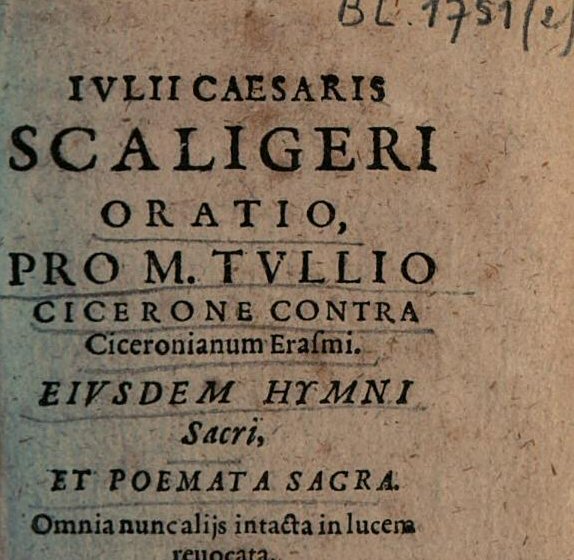 Analyses of all verses
Analyses of all verses
|
 Web Site
Web Site |
 All
Sefirots All
Sefirots |
NOSTRADAMUS C6 Q100 and Erasmus of Rotterdam (1466 – 1536CE)© Allan Webber Jan 2012CE See the following paper for the Rationale & Rules underlying my work on Nostradamus. |
|
Desiderius Erasmus Roterodamus
I believe that Erasmus and Jules Scaliger, two of the most prominent scholars in Europe at the time Nostradamus was in Agen are at the heart of one of the most distinctive verses in Nostradamus Prophecies verse C6 Q100. The things that convince me that this is so are:
- the correlation of the properties of the verse with the attributes for which they were famous,
- the hidden anagrams in the verse especially Erasmus' name and
- the nature of Nostradamus' known exposure to Jules Scaliger's life.
The verse is unique in the prophecies for several reasons prominent among which is that this verse is the only one in Latin, the only one with a fifth line in the form of a header and the sub ject of its text is markedly different to any other.
C6 Q100
|
I have always been in awe of this verse's masterful authority. To me its content has always made it the most likely keeper of the key to Nostradamus' Prophecies.
The following is an extract from Wikipedia (Jan 2012) that summarises important aspects about Erasmus.
Desiderius Erasmus Roterodamus (October 28,[1] 1466 – July 12, 1536), known as Erasmus of Rotterdam, was a Dutch Renaissance humanist, Catholic priest, social critic, teacher, early proponent of religious toleration, and theologian.
Erasmus was a classical scholar who wrote in a pure Latin style and enjoyed the sobriquet "Prince of the Humanists." He has been called "the crowning glory of the Christian humanists." Using humanist techniques for working on texts, he prepared important new Latin and Greek editions of the New Testament. These raised questions that would be influential in the Protestant Reformation and Catholic Counter-Reformation. He also wrote The Praise of Folly, Handbook of a Christian Knight, On Civility in Children, Copia: Foundations of the Abundant Style, Julius Exclusus, and many other works.
Erasmus lived through the Reformation period, but while he was critical of the Church, he could not bring himself to join the cause of the Reformers. In relation to clerical abuses in the Church, Erasmus remained committed to reforming the Church from within. He also held to Catholic doctrines such as that of free will, which some Reformers rejected in favour of the doctrine of predestination. His middle road approach disappointed and even angered scholars in both camps. He died in Basel in 1536 and was buried in the formerly Catholic cathedral there, which had been converted to a Reformed church in 1529.
From the perspective of Erasmus, Jules Scaliger may have seemed insignificant but this wasn't to remain the case as Scaliger succeeded in becoming known as one of the truly great intellects of his day after Erasmus' death in 1536. Because of the relationship and timing of Nostradamus acquaintance with Jules in Agen in the period before Erasmus' death in 1536 and up to 1538 he is a source of considerable impact for Nostradamus. Not only did he form his ideas and frame his path by contact with Scaliger but it is at this time in Agen that Nostradamus made lifelong contacts with some of those destined to be the most influential people in the future of Europe.
The Hidden Keys in C6 Q100
|
Reading the above extracts on Erasmus and the text of Nostradamus verse C.6 Q.100 it is easy to see that Erasmus fits the description of someone suited to be a participant in whatever message the verse contains, However Erasmus had died nearly 20 years before the quatrains were written and published. Yet in this verse is one of the two anagrams for Erasmus that are found in Nostradamus' Prophecies. I believe that Nostradamus wrote this verse for a specific audience and that names such as Erasmus were his ciphers for these people to use as markers.
And there are many good reasons why this verse should also be considered to contain a cipher for Julius Caesar Scaliger, the most prominent of Latin writer of his time. Firstly this quatrain is the only one in Latin which suggests the importance this language choice must have in identifying its import to specific readers. A further clue is Scaliger was considered by Erasmus to be an inept critic. Jules was prolific in his attacks on many scholars of his time and claims of ineptitude flew freely amongst him and those he criticised. Nostradamus' reference to the inept critic in his header again draws attention to the battle between Scaliger and Erasmus. it tells the knowledgeable reader that this is the verse where the key lies to whatever purpose Nostradamus' Prophecies serves. The solution in this verse lies within a group or sect that is highly interested in the issues that divided and united these two new conservative heretics (Erasmus and Scaliger) and who viewed Nostradamus as their own special courier. They were people Nostradamus had met in Agen during the time that Scaliger was in battle with Erasmus from 1533 to 1538CE.
 |
Wikipedia includes the following short statement that tells us much that is relevant to identifying the ciphers.
Scaliger, like many others of his time, also published works on Poetry and Religion. Some of these were published as collections in later years. |
Given the relationship that had once existed between the two men and Nostradamus high esteem of the contributions Scaliger made to his own progress, it wouldn't be at all surprising for this verse to have been used in the way I imply. However this quatrain was published in 1555 when Erasmus was dead and Scaliger was already confined to his bed and unable to adequately respond. Scaliger died in 1558, the same year that the second part of Nostradamus' Prophecies were officially published. Although both Scaliger and Erasmus are indicated as ciphers underpinning this verse it self-evidently wasn't in order for the attention of either of these men to be drawn to it.
The name, Erasmus, is to be found in the first line where it occurs in an anagram as ersus ma. The only other place where an anagram for this name can be found is C.3 Q.64 line 1 so it cannot be discounted as a commonly found letter group. Nor can those that are found behind the header where the following uniquely occurring anagrams occur:
- LEGIS CANTIO CONTRA IN EPTOS CRITICOS
- Angliciste ( meaning a student of English- which Erasmus was)
- LEGIS CANTI O CONTRA IN EPTOS CRITICOS
- Notaricon or Notarikon ( is a method of deriving a word, akin to the creation of an acronym, by using various but fixed order combinations of letters from each word. The word "notarikon" is related to the Latin word "notarius," meaning "short-hand writer." or contracted writing)
- LEGIS CANTIO CONTRA IN EPTOS CRITICOS
- Contraction
- Critic(s)
Now these words are found together with other more frequently found anagrams which are often adjacent to these rare ones and this gives all of them extra poignancy. For example there is Contraction. in.Poet.Critics, Angliciste.Notaricon.Poets.Critic or the whole line can be completed to read So.Angliciste.Poet.Notaricon.Critic. The term angliciste is very interesting since it can be readily applied to Erasmus. He had spent several periods in England, most notably from 1509 to 1514 and he maintained many of these contacts thoughout his life. However it also applies to a great deal of scholars in that era, especially those linked to Marguerite de Navarre whose territory included Nerac, 15 kilometres from Agen. Nerac, under Marguerite's rule, was a haven for radicals and those under stress. Erasmus was one of the guests to this region as were Calvin and the poet Rabelais. And although this verse was self-evidently not aimed at Erasmus who died in 1536CE it may well refer to one or more of Erasmus' friends or students. Julius Scaliger on the other hand had no interest or liking for the English so the angliciste epithet can't apply to him. However, whatever way these rare anagrams are reconstructed there seems to be a meaningful coding purpose underpinning this verse, a conclusion that is strengthened by the anagrams found in the other lines of this verse.
The first line saying Quos legent hosce versus mature censunto has anagrams which yield Erasmus chose-length consequent verse a true.sum. Consequent occurs as anagrams in a total of 5 quatrains while verse.a.true.sum is an adjacent sequence. The anagram that provides this sequence is only found in this verse as is a.true.sum.
The second line is equally as intricate and relevant to the messages already shown. In its wording Profanum vulgus et inscium ne attrectato we find guest.in.music where both guest and music are reasonably rare (four other occurrences each). Although other anagrams like proof occur more frequently (20x for proof) they form a powerful sequence that states Proof num-value guest in music. There is also an anagram for neumatics which occurs here and only one other verse. The word relates to the notation of incantations and chants using neumes as musical-value ciphers. Given that this verse is meant to be an incantation and the previous line's hidden content alludes to a true sum there is a coherence given to the whole and it flowers into a beautiful coding scheme based on the structure of a verse and using ciphers based on the same principle as music in the 16th Century.
There is one other anagram found in the 2nd line and it is is unique being found nowhere else in the prophecies. This word is Vulganum and it forms a sequence which uses most of line to say Proof.Neumatics.Unites.Vulganum( reference to book of common prayer).
The evidence I have presented above tells us that the key to Nostradamus work is somehow tied into two famous 16th C figures, Erasmus and Julius Scaliger, yet it was clearly not intended for them. Although it can be shown there is strong evidence that this verse is about a coding scheme there seems to be allusions to 16th C music as well as poetry. In addition the verse 's text highlights the religious aspect of Nostradamus intended cipher. It is therefore highly possible that guests to the region of Nerac formed a sect (or group with common goals) into which Nostradamus had been initiated and his career path then determined by them.
It is possible to trace these conclusions in many other powerful verses in the Prophecies. From these verses I believe my analysis reveals that their purpose is to further the prospects of the Bourbon line and to validate its claim to being part of the lineage of Christ. I also show that it is likely this sect infiltrated the royalty of Europe including that of England and Scotland.
END of PAPER